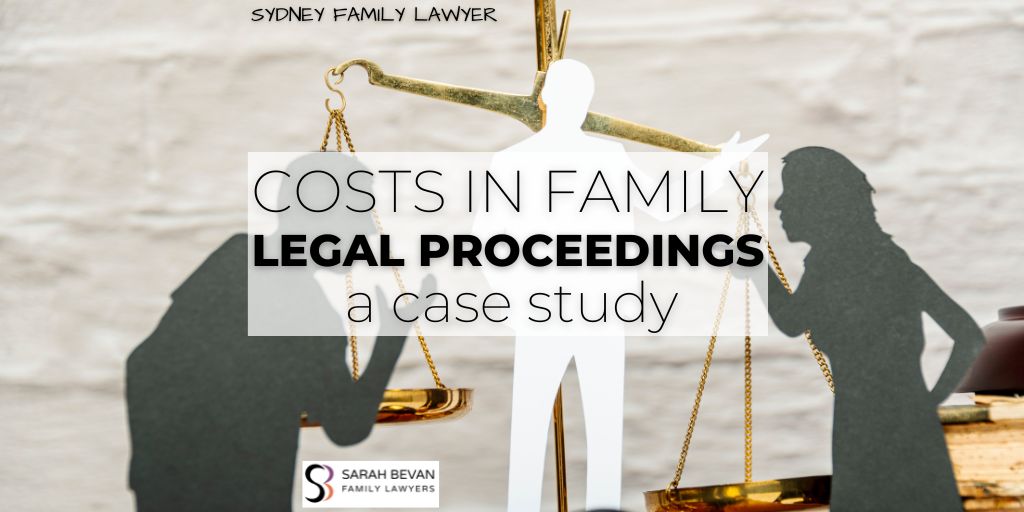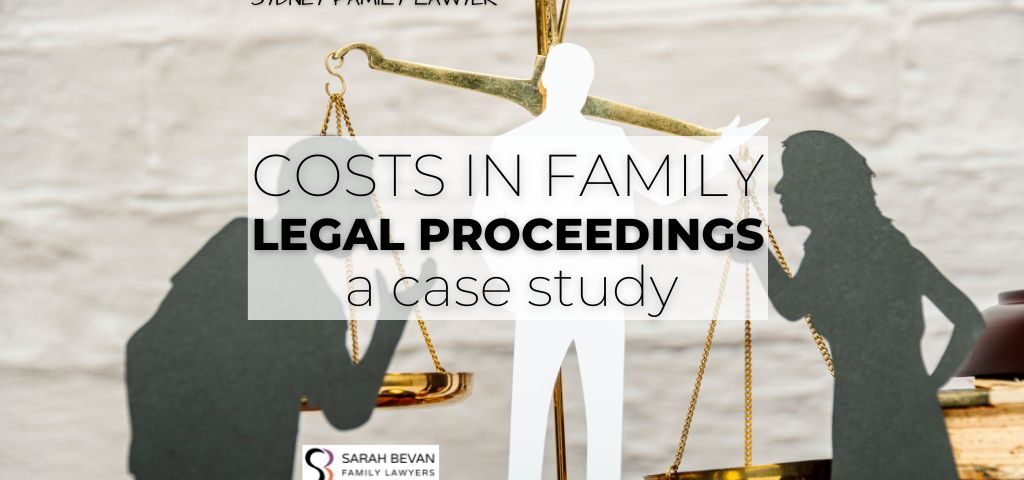- Sydney Family Lawyers
- (02) 9633 1088
- mail@sbfamilylawyers.com.au
Costs in family law proceedings – A case study
Who pays the legal costs?
Many people involved in the family court process do not understand who is responsible for paying the legal costs. The general principle is that each party is responsible for paying their own legal costs.
However, the Court has the discretion to order one party pay the other party’s costs in limited circumstances.
Can a order for costs be made by the Court?
Section 117 of the Family Law Act 1975 deals with what the Court will consider when deciding if an order for costs should be made, and those considerations include the following:
- The financial position of the parties
- The conduct of the parties throughout the proceedings
- Whether a party has been wholly successful on their application
- Offers of settlement made
The case of Roydon & Roydon [2024] FedCFamC1A 105, an appeal decision, is a useful case which highlights how the Court approaches costs applications. Some background facts are:
- The parties commenced their relationship in 2006 and married in 2007. They separated in January 2021, and there were 3 children of the marriage aged 16, 12 and 8 years old at the time of hearing.
- The proceedings were about both parenting and property matters.
- Both parties made allegations against the other about mental health issues, and they had perpetrated family violence.
- There were two interim hearings in the matter.
- There were numerous offers by the parties to settle all or part of the matter.
- The final hearing was listed for 4 days in October 2022. The parties settled on the third day of the hearing after lengthy negotiations.
- Three weeks later, the mother filed an application seeking a costs order against the father.
- The trial Judge made an order that the father pay the mother’s costs in a fixed amount of $100,000.
- The father appealed that order.
Ultimately on appeal, the appeal Judge upheld the appeal on a number of grounds. Usefully, the Court examined various aspects of costs applications and orders.
Financial position of the parties
In making the original costs orders, the trial Judge found that the father had a superior income to that of the mother. That factor on its own would not support a costs order, but is a relevant consideration.
Conduct of the parties
The conduct of both parties during the proceedings was extreme. The trial Judge was cautious about making findings in relation to the conduct of the parties, but did conclude that the father engaged in behaviour which was bullying and harassing of the mother, which resulted in an increase of her legal fees. There were three examples provided by the trial Judge to support this:
- The father made repeated forceful attempts to compel the oldest child to spend time and communicate with him, despite being urged by the mother, the independent children’s lawyer and the child’s mental health practitioners to reconsider his approach;
- The father persisted with applications for the children to live with him beyond the point when it should have been obvious that such applications were unlikely to be successful;
- Other behaviours by him suggested he was motivated by, at least partly, feelings of animosity towards the mother rather than the best interests of the children.
Whether a party had been wholly unsuccessful
The trial Judge found that neither party was wholly successful or wholly unsuccessful at the first interim hearing, but that the father was unsuccessful in the second interim hearing, although his opposition to interim relocation of the children was not unreasonable. The trial Judge found that the father was wholly unsuccessful at each critical stage of the proceedings.
The appeal Judge found the trial Judge had erred on this ground because to find that he had been wholly unsuccessful was overstating the outcome.
Offers
There were many offers made throughout the case. Of particular note was an offer made by the mother on 2 May 2022. The trial Judge found that in terms of property, she ultimately obtained a better settlement than the offer she made, and in terms of parenting, the outcome was the same as what she had offered. The trial Judge then found that the mother should not be out of pocket for costs from the point of that offer onwards, as both parties would not have incurred such significant legal costs if the father had accepted that offer.
The trial Judge found that the father should pay indemnity costs rather than the more common party/party costs, which are typically lower (often substantially so) than indemnity costs.
Will a costs application be successful?
There exists a loose description about whether a costs application is likely to be successful, which is that it depends on whether one party obtained a better outcome (for themself) than their offer. Importantly, the appeal Judge pointed out that there are two steps in consideration of this principle:
- Firstly, the outcome needs to be compared with the terms of the offer. The appeal Judge carefully compared the terms of the offer with the outcome and found that the outcome actually resulted in the father having more time with the children than the offer provided, and that spouse maintenance had not been included in the offer but was part of the outcome. In those respects the mother did not achieve the same, or better, than her offer. The terms of the property settlement offer were considered and the father argued that although the mother received more than the offer she made, this was because of the differences in values at the two points in time. This argument was not accepted by the trial Judge.
- Secondly, it needs to be determined, in the individual circumstances of the case, whether it was unreasonable to decline the offer.
Important points about court cost applications
This, and other cases, about costs issues highlight a number of points to keep in mind:
- Simply because the one party earns a lot more, or got a ‘better deal’ than the other party, it does not then follow that the financially weaker party will be able to get a costs order in their favour.
- If one party does not conduct themselves appropriately in the proceedings, that should not ever be a basis for the other party to conduct themselves similarly. The previously ‘behaving’ party may lose their chance of obtaining an order for costs if they start ‘misbehaving’ in the proceedings.
- Costs do not follow the result in family law, unlike in many other types of law. But if you are wholly successful in the proceedings, or part of them, that may give you a basis for a costs application.
- Offers of settlement can be made at any time during the proceedings, and should always be aimed at resolving your case. But they can also be an important tool to support a costs application at a later date.
- Offers need to be precise, and will likely only be meaningful if made after full disclosure has been provided.
Costs orders in all cases are rare, and especially so in parenting cases. The decision to make costs orders is at the discretion of the judge who will have regard to all of the circumstances of the cases as a whole, as seen in the above case, the circumstances can be quite complex and the pursuit of a case may be reasonable for one party even though they fail. Never assume you will get an order for costs in your favour, even if you think you deserve it!
Sarah Bevan and her team of Family Lawyers will guide you through the process and give realistic advice if you have a cost order against you, or if you would like to apply for a cost application.

costs in family law proceedings cost order for court costs sydney



